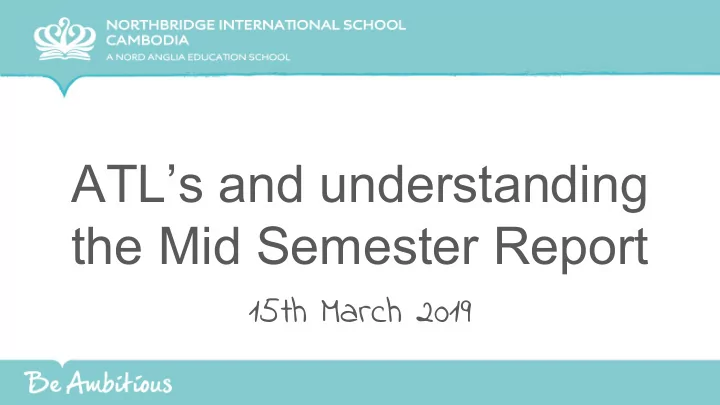

ATL’s and understanding the Mid Semester Report 15th March 2019
Agenda ● MYP Diagram ● How students are assessed ● What are the ATL’s and why are they important? ● How are the ATL’s used to record student progress? ● What can you do as a parent? ● Questions
MYP Framework
How students are assessed ● 4 reports per year ○ 2 Mid semester reports based on ATL’s (approx October and March) ○ 1 Mid year progress report (December) ○ 1 End of year report (June) ● Progress and end of year reports based on criteria in each subject ○ MYP 8 subjects ○ DP 6 subjects ● Mid semester reports based on Approaches to Learning (ATL’s) that teachers have explicitly taught within their units of work
Title here...
What are the ATL’s and why are they important? It is: ● Thinking ● Understanding ● Remembering ● Improving ● Gaining knowledge ● Applying knowledge ● Transferring knowledge
What is learning Three types of learning: ● Cognitive skills- most useful in helping to acquire new knowledge and skills ● Affective skills- help to gain greater control over aspects of learning, such as motivation and self-concept ● Metacognitive skills- overarching skills that drive the whole learning experience and through which the greatest improvements in academic performance can be achieved
6 Examples of Metacognition Skills You May Use 1. Knowing the limits of your own memory for a particular task and creating a means of support as needed. 2. Self-monitoring your learning strategy, such as concept mapping, and then adapting the strategy if it isn’t effective. 3. Noticing whether you comprehend something you just read and then modifying your approach if you did not comprehend it. 4. Choosing to skim subheadings of unimportant information to get to the information you need. 5. Repeatedly rehearsing a skill in order to gain proficiency. 6. Periodically doing self-tests to see how well you learned something. -Connie Malamed 2019
Metacognitive Strategies 1. Ask Questions. Ask questions that allow learners to reflect on their own learning processes and strategies. In collaborative learning, ask them to reflect on the role they play when problem solving in teams. 2. Foster Self-reflection. Personal reflection during and after learning experiences. Encourage learners to critically analyse their own assumptions and how this may have influenced their learning. 3. Encourage Self-questioning. Foster independent learning by asking learners to generate their own questions and answer them to enhance comprehension. The questions can be related to meeting their personal goals 4. Teach Strategies Directly. Teach appropriate metacognitive strategies. 5. Promote Autonomous Learning. Encourage participation in challenging learning experiences.
Metacognitive Strategies 6. Provide Access to Mentors. Many people learn best by interacting with peers who are slightly more advanced. Promote experiences where novices can observe the proficient use of a skill and then gain access to the metacognitive strategies used by others. 7. Solve Problems with a Team: Cooperative problem solving can enhance metacognitive strategies by discussing possible approaches with team members and learning from each other. 8. Think Aloud. Teach learners how to think aloud and report their thoughts while performing a difficult task. A knowledgeable partner can then point out errors in thinking or the individual can use this approach for increased self-awareness during learning. 9. Self-explanation . Self-explanation in writing or speaking can help learners improve their comprehension of a difficult subject. 10. Provide Opportunities for Making Errors. When learners are given the opportunity to make errors, such as during simulations, it stimulates reflection on the causes of their errors.
How are ATL’s used to record student progress “Through approaches to learning (ATL) in the IB programmes, students develop skills that have relevance across the curriculum that help them “learn how to learn”.”- IB Design Guide 2014 “...metacognition is a set of skills that enable learners to become aware of how they learn and to evaluate and adapt these skills to become increasingly effective at learning. In a world that demands lifelong learning, providing people with new and improved metacognitive strategies is a gift that can last forever.”- Connie Malamed 2019
Mid Semester Reports There are 4 classifications that teachers use when assessing ATL’s on the Mid Semester Report: EE- Exceeding expectations ME- Meeting expectations AE- Approaching expectations BE- Below expectations NOT an academic progress report It IS a report that informs how students are using skills to learn to assess the subject content and concepts
What can you do as a parent? ● Talk to your child each day and ask what they do to understand something new- regularly check Managebac with your child ● Support them in understanding that failure can lead to success if they use different ways to approach a problem ● Discuss processes you use to understand new things and strategies you have to keep yourself organised ● Encourage them to seek assistance from peers and in class to further their understanding of strategies that can be used to complete tasks ● Help them understand that even simple routines, like packing a bag the night before and regular bedtime leads to understanding concepts of processes in learning ● Keep coming into school to talk to teachers as we are all on the same team
Questions
Recommend
More recommend